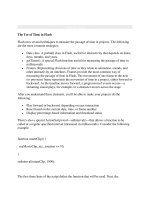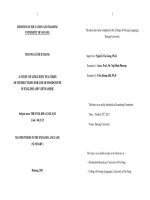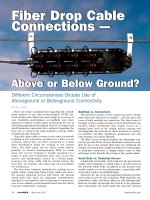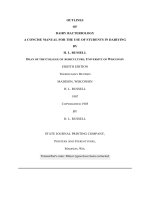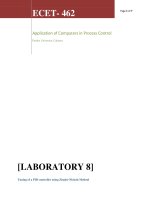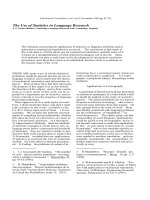USE OF ANIMATION IN INFORMATION VISUALIZATION pptx
Bạn đang xem bản rút gọn của tài liệu. Xem và tải ngay bản đầy đủ của tài liệu tại đây (1.78 MB, 19 trang )
George G. Robertson
Principal Researcher
Microsoft Corporation
Distraction
false relations
false agency
“chart junk”
too slow: boring
too fast: errors
direct attention
change tracking
narrative
increase interest
Attention
Object Constancy
Causality
Engagement
Calibration
Hurts?
Helps?
Character Animation (Lasseter 1987, based on
Thomas and Johnson 1981)
Squash and stretch
Exaggeration
Anticipation
Staging
Slow-in / Slow-out
Animated Presentations (Zongker, Salesin 2003)
Make movement meaningful
Avoid unintended perceptions of agency
Avoid squash-and-stretch, exaggeration
Direct attention, aid comprehension
Use anticipation and staging
Do one thing at a time
Reinforce animation with narration
Distinguish dynamics from transitions
Congruence Principle
• The structure and content of the external representation should
correspond to the desired structure and content of the internal
representation
Apprehension Principle
• The structure and content of the external representation should be
readily and accurately perceived and comprehended
Congruence
Maintain valid data graphics during transitions
Use consistent syntactic/semantic mappings
Respect semantic correspondence
Avoid ambiguity
Apprehension
Group similar transitions
Minimize occlusion
Maximize predictability
Use simple transitions
Use staging for complex transitions
Make transitions as long as needed, but no longer
Transition Animation
• Short animation keeps user in context during view/data transitions
Trend Animation
• Show data changes over time
Static Depictions of Motion (Baudisch, 2006)
• Semi-transparent trails to show change over time
Kinetic Visualization (Ware, 1994)
• Objects in a set shown moving together at the same speed
Animation to Illustrate a Process
• Algorithm animation was early example
Hierarchy visualization
• Use of transition animations to retain
user context
• Constant time:
~ 1 second (from Newell’s theory)
• Use of 3D made it possible to see
much more of structure
8
Video
Multiple Intersecting
Hierarchies
• Show multiple hierarchies
• Search results in context
• Show minimal info needed
• Animated transitions key
• Keeps user in context
• Six user studies demonstrated
value of transition animation
significance
• Rotations define 3D form
• Translations define observer-relative displacements
• Suggests Visual Pivot sliding animation may be perceived as
observer-relative while rotating animations may be perceived as
defining 3D form
• User task determines which is more useful
Animated transitions
• Between chart types
• For new data
• For changed data
• For sorted data
Use of staggered/staged
animations was effective
User studies show
significant benefits
Demo
Gapminder Trendalyzer appears successful in presentations
• Works because presenter draws attention to relevant changes
• Study shows it is most enjoyable & exciting, but not always preferred
Does it work for analysis?
• No: multiple replays make it
slowest technique, and not very accurate
Does it scale?
• No: works for up to about 200 data points
Are there alternatives that work
better under some conditions?
• Yes: static depictions of trends are faster for analysis
• Yes: small multiples is more accurate
Video
Traces
• Show all trends
simultaneously
• Fade-in bubbles/links to
show direction of flow
• Counter-trends pop-out
(without replay)
• Clutter may pose problem in
some cases
• Could be addressed by
automatic anomaly
highlighting
Small Multiples
• Show each trend separately
• Use bubble size to show
direction of flow
• Counter-trends pop-out
• No clutter, but user must scan
for answer
• Larger dataset size
smaller multiples
Trend visualization techniques must include all
three alternatives
• Each has distinct advantages for particular situations
• Trend animation works best for presentation
• Traces works best for analysis when the result is not in the clutter
• Small Multiples works best for analysis when there is key information in
the clutter
Transition Animation
• Studies show that fixed time (1/2 to 1 sec) transition animation
• Improves user task performance time
• Decreases errors
• Improves user satisfaction
• Studies show additional improvements for carefully used multi-stage
and/or staggered animation sequences
Trend Animation
• Gapminder Trendalyzer appears successful in presentations
• Does not work well for analysis!
• Static animation alternatives work better under some conditions


